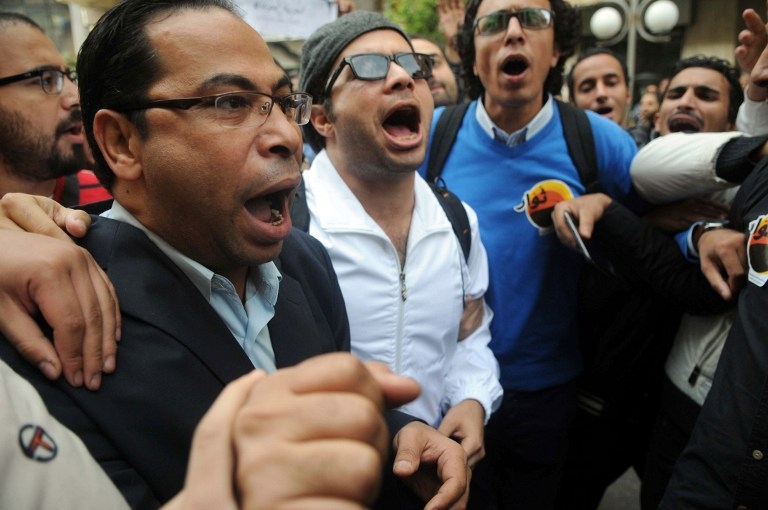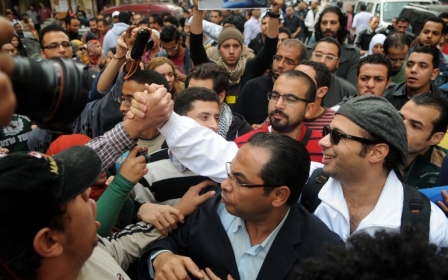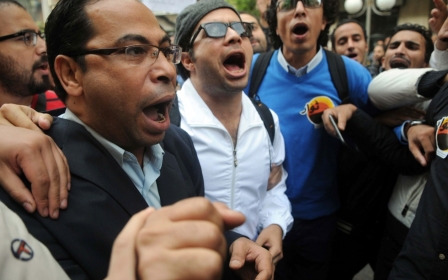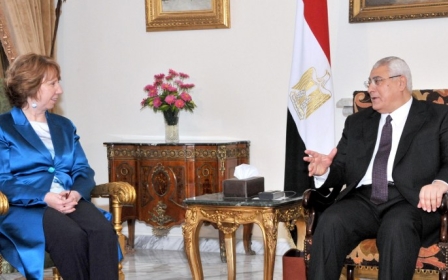Egypt's April 6 movement reportedly denied anniversary celebrations

The Egyptian government reportedly denied April 6th Movement from celebrating its seven year anniversary on Monday, said activists on the ground.
Translation: Security forces deny April 6 Movement from holding celebrations in Moez St marking their anniversary. Freedoms no longer exist in Egypt.
The April 6th Movement is an Egyptian activist group established in Spring 2008 to support the workers in El-Mahalla El-Kubra, an industrial town, who were planning to strike on that day.
Activists called on participants to wear black and stay home while bloggers and citizen journalists used social media to report on the strike and alert demonstrators about police activity.
Several political groups took part in the strike in 2008, including the al-Ghad Party, the Labour Party, the Democratic Front among others.
Among the movement’s prominent figures are Ahmed Maher, arrested on 29 November for demonstrating against the protest law and Ahmed Douma, detained on 3 December 2013 following a protest he organised against military trying of civilians.
Both were sentenced on 22 December 2013 to three years in prison with hard labour.
The Egyptian protest law was passed on 24 November 2013 by former president Adly Mansour, a three-day notification is required before protesting, while the Interior Ministry also has the right to "cancel, postpone or move" the protest if it determines that protesters will "breach ... the law".
Since the law was passed, demonstrations have been violently stifled by police raising concerns among national and international rights groups regarding freedom of speech and assembly.
Human Rights Watch issued a statement on 26 November 2013 saying, “Egypt’s new law on public assembly will restrict peaceful political demonstrations in violation of international standards.”
Despite these restrictions, dozens of Egyptians affiliated with group called the Revolutionary Alternative reportedly protested in front of the Saudi embassy in Cairo against the Saudi intervention in Yemen on Saturday, according to al-Taqreer online newspaper.
The group chanted slogans against Saudi King Salman ibn Abdul Aziz and a number of Shiite activists who reject the Saudi-led coalition’s attack on Yemen, while Egyptian police reportedly stayed clear of the scene.
Members of the leftist movement supportive of President Abdel Fattah al-Sisi reportedly participated in the protests, calling for an end to what they named as the "Saudi aggression against Yemen,” while others called on the Egyptian government to sack the Saudi ambassador to Cairo.
Another demonstration was reportedly also organised in front of the Journalists Syndicate in Cairo.
There have been speculations regarding the authorisation of the protest. It was not clear if the organisers of this protest had secured authorisation from the Egyptian authorities.
Some observers have pointed towards the protest being a spontaneous show of support for the Yemeni people, while others however said that the Egyptian authorities may in fact be supportive of the demonstration, reported al-Taqreer.
Some observers wrote via social media: "The protests may have in some way been supported by the Egyptian government especially that since Sisi came to power in July 2013 demonstrations and sit-ins have been violently suppressed by the police forces.”
Others said that the demonstrations may signify Egypt trying to garner greater financial support from Saudi Arabia after showing the Kingdom the presence of Egyptian opposition to sending ground troops to support the military intervention in Yemen.
Egypt’s involvement in Yemen is concerning to many, rekindling memories of President Gamal Abdel Nasser’s involvement in Yemen in the 1960s to support the Yemeni Republican coup d’état against the ruling Imam, who was backed by Saudi Arabia. The intervention drained Egypt’s military and financial resources.
Recent reports have pointed to a deepening divide between Egypt and Saudi Arabia, specifically regarding the issue of Yemen and the Houthis.
Signs of tension between Saudi Arabia and Egypt over their policies in the Middle East have surfaced with an apparent squabble taking place between Egyptian President Abdel Fatah al-Sisi and Saudi Foreign Minister Saud al-Faisal, during the Arab League summit at the Egyptian resort of Sharm el-Sheikh.
While official Saudi and Egyptian statements do not reflect a this split between the two states and while Riyadh has continued its financial backing of Cairo since the overthrow of President Mohamed Morsi, prominent media figures from both countries have recently been engaged in a tit-for-tat public spat, highlighting policy differences that are not acknowledged on an official level.
Other reports have also shown that the Egyptian government may have been in talks with the Houthis before the Saudi military operation was launched on 25 March, leading observers to believe a rift between Egypt and Saudi Arabia has indeed been deepening.
Middle East Eye propose une couverture et une analyse indépendantes et incomparables du Moyen-Orient, de l’Afrique du Nord et d’autres régions du monde. Pour en savoir plus sur la reprise de ce contenu et les frais qui s’appliquent, veuillez remplir ce formulaire [en anglais]. Pour en savoir plus sur MEE, cliquez ici [en anglais].




